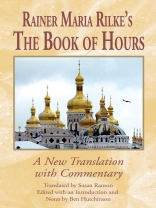Rainer Maria Rilke is arguably the most important modern German-language poet. His
New Poems, Duino Elegies, and
Sonnets to Orpheus are pillars of 20th-century poetry. Yet his earlier verse is less known.
The Bookof Hours, written in three bursts between 1899 and 1903, is Rilke’s most formative work, covering a crucial period in his rapid ascent from
fin-de-siècle epigone to distinctive modern voice. The poems document Rilke’stour of Russia with Lou Andreas-Salomé, his hasty marriage and fathering of a child in Worpswede, and his turn toward the urban modernity of Paris. He assumes the persona of an artist-monk undertaking the Romantics’ journey into the self, speaking to God as part transcendent deity, part needy neighbor. The poems can be read simply for their luminous lyricism, captured in Susan Ranson’s superb new translation, which reproduces the music of the original German with impressive fluidity. An in-depth introduction explains the context of the work and elucidates its major themes, while the poem-by-poem commentary is helpful to the student and the general reader. A translator’s note treating the technical problems of rhythm, meter, and rhyme that the translator of Rilke faces completes the volume.
Susan Ranson is the co-translator, with Marielle Sutherland, of
Rainer Maria Rilke, Selected Poems (Oxford World’s Classics, 2011). Ben Hutchinson is Reader in Modern German at the University of Kent, UK.
Table of Content
Preface and Acknowledgments
Introduction by Ben Hutchinson
Translator’s Note by Susan Ranson
Das Stunden-Buch /
The Book of Hours
Erstes Buch: Das Buch vom mönchischen Leben
First Book: The Book of Monkish Life
Zweites Buch: Das Buch von der Pilgerschaft
Second Book: The Book of Pilgrimage
Drittes Buch: Das Buch von der Armut und vom Tode
Third Book: The Book of Poverty and Death
Commentary and Notes: First Book, Second Book, Third Book
Index of English First Lines
Index of German First Lines












